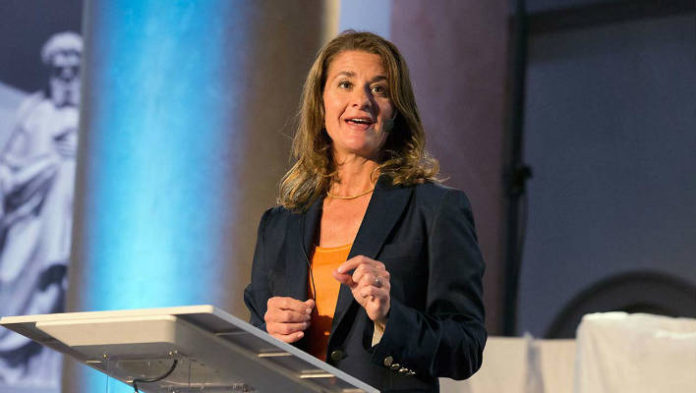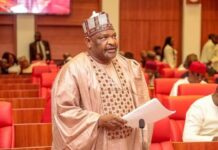
Melinda Gates is co-chair of the Bill and Melinda Gates Foundation. Along with Bill, she shapes and approves the foundation’s strategies, reviews results, and sets the overall direction of the organisation. Together, they meet with grantees and partners to further the foundation’s goal of improving equity in the United States and around the world. Through her work at the foundation over the last 15 years, Melinda has seen first-hand that empowering women and girls can bring transformational improvements in the health and prosperity of families, communities and societies. Her experiences have led her to increasingly focus on gender equity, as a path to meaningful change. The second of four children, Melinda grew up in Dallas, Texas. She received a Bachelor’s degree in computer science and economics from the Duke University in 1986 and a Master’s in business administration from the Fuqua School of Business in 1987. After joining Microsoft Corp. that year, she distinguished herself as a leader in the development of multimedia products and was later appointed Microsoft’s General Manager of Information Products. In 1996, Melinda left Microsoft to focus on her philanthropic work and family. She lives with her husband and three children in Seattle, Washington. She visited Nigeria recently and had this interview with EMEKA ANUFORO.
Let’s start with your background. What was growing up like?
I grew up in a southern state in the United States. We were a very middle class family and my parents really believed in each of us getting educated and going to the university, which I did. Microsoft recruited me right out of university. I went to one of his computer trade shows as a staff and that was how I met Bill.
Was there any initial spark, when you first met?
I was not at Microsoft for long. I had only been there for just a few weeks and I went to Europe to a computer trade show. It was a dinner. I was there for a different reason, but Bill (Gates) was there for his computer trade show. The person I was with thought that since I was from Microsoft and had just joined the organisation, I should attend the dinner and that I could meet some colleagues. I was only just three weeks at Microsoft.
So, I went to this dinner and sat on the second to the last chair. I was late because I was coming in from other business appointments and Bill came in, the latest, and sat on the last chair next to me. That was how I met him.
How does being part of the world’s biggest man affect your life, and that of your children and things around you?
It is very interesting. Bill and I grew up in families that have very good values— values of giving back to the community. His parents were very much into that. My parents were into volunteerism. And so, we have tried to live as normal a life as we can, particularly for our kids. We have three kids and that’s to say that we have a responsibility to give back to the world. That is what we are trying to teach our children.
So, even though we have wealth and we live in the midst of wealth, but we try to be as normal as possi§ble. For instance, if you were in our home at night for dinner, you would see that it’s pretty normal— normal dinner table conversation. Everybody gets up and does the dishes and puts out the trashes together as a family, because we want to grow that way as a family, and with that kind of life.
Are your kids participating in volunteer work at all?
Absolutely! They all participate in opportunities. When they were little, I would take them out with me in the local community. All of our kids have been to Africa numerous times and not just for the Safari, though they love the Safari. My oldest daughter and I lived with a family in Tanzania for a few days. My son and I lived with a family in Malawi in a very poor rural setting and my youngest daughter spent two weeks in Rwanda a few years ago, three weeks last summer, and now she is begging me to do even longer this coming summer.
And it’s great because that way, they get to see what life is like for people in other places in the world and then they have, I think, an appreciation of how pretty different things are in Africa compared to the United States; and they have all started thinking about what they might do. They have got what they are good at in the world and we want them to have their own world, but eventually what do they want to do to give back to the world? How can they also help to give back in some way?
Beyond giving back, how do you relax? Do you also get Bill to relax?
Very good question! We love to watch movies. I haven’t seen the Nigerian movies you mentioned earlier. On Friday nights, as a family, we tend to watch movies at home that hopefully everyone can agree on, or Bill and I would go out with another couple or a date night on Saturday night and go watch a movie.
Bill and I really love to do puzzles together. So, when we are on vacation, I would bring a puzzle and we would do that. He also relaxes and loves to play Bridge quite a bit online. So, he would sit on his desk all night, reading emails, clicking around news. He plays a lot of online Bridge, but I have nothing to do with that. I played Bridge for a little while, but then I gave it up. So, it is all his. When one hears of Bill Gates, what comes to mind is somebody who is immersed in technology and computers and hardly has time for any other thing apart from computers…
He does! Last week was a national holiday. We came into the United States to observe Martin Luther King’s birthday and it was a three-day weekend. So, we went skating as a family. He loves skating racing. He is the best skater in our whole family. He skates and plays tennis. We still have to kind of pull him out of his computers to do those things, because he greatly loves being with his computers.
How did the Foundation start? What was the motivation beyond you pulling out of regular work to fully take up duty with the Foundation?
When Bill and I got engaged, it was the first time either of us would ever come to Africa. That was in September 1993. We came on a trip together and we brought some other couples with us. We were on a big safari. During that trip, we had decided that the resources from Microsoft would go back to society. We were to be married in a few months, and we both completely agreed that a very large percentage of the resources would go back to society. While travelling around Africa, we were touched by the animals, just as we were also touched by the people. We were worried that there were so few places with electricity, especially in the rural areas. We wondered why things don’t work the same way, as they do in other parts of the world we had been to.
So, we started asking ourselves questions and what we could do about that. It wasn’t long after we came back from that trip that we read a New York Times article about children all over the world dying from diarrhoea. We kept saying to ourselves, ‘but children in the US and Europe don’t die of diarrhoea.’ So, we started learning about why that was, where we might help and what a Foundation could potentially do, particularly in the area of child health. And so, we got going at the Foundation much earlier than we expected. It really became a learning journey. Even though we were a young family, with Bill working full-time, we would spend time on trips. However, it was not just about the luxury part of the trip, but also seeing more of the world, seeing the other side. We started gathering some scientists around us and asking questions and learning about where philanthropy might make a lot of difference, particularly in childhood health and adult health.
There is a lot of focus on Africa. Why is this?
We really took a very economic approach and we looked at the biggest killers of children around the world and why children were so vulnerable. We also looked at why adults were dying and the cause of their death. When you look at those charts, you discover that children are dying of diseases and illnesses they needn’t contract in the first place.
When you look at where this is happening in the world, you end up basically with two Northern States in India and a lot of places in Africa. And so we said wow! There are things that could be fixed about the supply chain, we have to get out the vaccines. We don’t have malarias anymore in the United States, but malaria persists in a lot of other places in the world, and if we could get vaccines out there, it could save the lives of a many adults and children, which happens and that happens to be in a lot of places in Africa and South East Asia.
No doubt a lot of countries and organisations that you work with probably feel it’s a ‘Santa Clause’ kind of philanthropy you are into. How do you get them to take ownership and truly participate as partners?
There is nothing we can do in the world, unless a country decides it’s their priority. So, we can’t tell a country it should care about childhood death. The country has to say it cares about how mums and children are faring and decides on what it can do in that regard, and if there is a way other people can help them with it. So, we go in with governments’ priorities and helping to nudge those priorities. But it really has to be the government and NGO sector on the ground that will scale things up. Because ultimately, they are the ones that know the local context.
Government and partners on ground understand far better the issues between the Northern and Southern parts of Nigeria. And what works in Kaduna might be different from what works in Borno or Lagos. We cannot do that from our base, and we really shouldn’t. It has to be the government’s priorities. All that philanthropy can do is to be a catalytic edge. We can show some experiments. We can help get a new vaccine that maybe your government might not otherwise spend the resources on, to help them decide to invest in a malaria vaccine. We can get one that we know works and then it’s up to the government to scale that up and say, “Yes, we are going to take that. We have a lot of malaria in our country. We have a lot of childhood deaths; we want a vaccine. “
What have been some of your big moments doing this work? Looking back, what has made you feel very fulfilled?
Vaccines! They are the miracles that save children. For less than US$30, you can save a child’s life with a vaccine. When I say $30, it is not that much for the vaccine, but that is the cost to get it all the way out to the child. There are over 600 million children who are alive today because of the vaccine initiative we got involved in, which started in 2000. A public-private partnership that enabled us have a lot of money and go to vaccine companies and say: “Create a childhood vaccine for pneumonia or for retroviral.” We were able to stimulate pharmaceutical companies to create the vaccines and use that funding to get them out to the country. That is probably what I am most proud of – that children are alive because of those clinics.
I was in a clinic yesterday in Badarawa, Kaduna State, and it happened to be the immunisation day. There were 50 mothers on the queue with their babies to get those shots, because they know the difference they are making in their children’s lives. They have the opportunity of helping their kids grow up healthy.
The private sector in this part of the world is yet to be fully in the habit of giving back to the society in sustainable ways. There are few exceptional cases, but nothing compared to developed countries. Is there a template you wish to propose to change this?
I think each country has to get the sectors working together. Where we see real progress in certain countries on, say, malaria, it is because you have the government, the private sector, the NGOs and the civil society all working together to identify priorities and learn from one another. One of the countries that come to mind on malaria is Zambia. They decided they were going to go all out on malaria. So, the copper mining companies came together with the government, NGOs and the civil society; and they really had a great distribution system. It took them five years to figure out how to deliver bed nets. Right now, they are rolling out other things, other medicine combination therapies, which you see also in Nigeria.
You’ve got to get all those players working together. The Foundation comes in with a role, saying we are just one of the partners, but we will try. I was in a meeting just before this. It was a roundtable of partners, each doing their piece on a particular area of health –one group pushing the Federal Government, another group pushing the state government, and yet another group fixing the supply chain or figuring out how to generate demand. We come in and try to gather the partners together because I think that is the only way you can get things to work in a country.
Why the focus on women and children?
Because at the end of the day, women move the society up. They give birth to the children, and they have the ability to move their families out of poverty. We know that if a woman is empowered, if a woman goes to school and gets educated through high school, her daughter is twice as likely to be educated. For instance, if a woman spaces her children by three years, her next child is twice as likely to make it to his or her first birthday. She makes a lot of decisions in her household concerning who eats what, what the child’s health is, and yet there are so many societies, where women aren’t yet empowered.
If we can help women get empowered, help them with their health and their children’s health, help them get an education, they lift up their families, and that ultimately lifts up society. I have seen it time and again, wherever I travel in the world. Yet, women aren’t always given those opportunities. I want to make sure that they are given those opportunities.
If a woman is empowered, she empowers everybody around her. If she survives and is thriving, her kids are going to survive and thrive. If you can help give her the right things: the right health tools, a chance to get an education, she can break the cycle of poverty and lift her family out of that. But, conversely, if you don’t give her the right tools, you lock her in a cycle of poverty that her kids are likely going to be trapped in, too.
What is the purpose of your visit to Nigeria?
For me, this is really a learning trip. I am here to learn more about these primary healthcare centres that the government is focusing on, and how they can serve families better, particularly women. I was in Kaduna, yesterday, and met the Governor of Kaduna, who has a big focus on health, which is great. I was at a primary healthcare clinic in Badarawa, where I talked to a lot of women that visited the clinic with their families. If the government gets things right with these primary healthcare centres, we can really change the statistics for women and children in the country. The maternal death rate is still very high in Nigeria, which can be brought down. We have seen it brought down in countries all over the world. I want to see what Nigeria is doing and the pieces that need to be lined up for that.
I want to learn more about what is going on with nutrition. There is a lot of malnutrition in the country, very high stunting rates. Thirty-seven per cent of children are stunted. I want to learn more about why it is so and what is going on. I also want to know about breast-feeding. Is the right message about breast-feeding being passed to women? So, this is really a learning trip to take ideas back on how we can help the government with its priorities and what other investments are to be made.
In terms of women and children, what is your projection for Africa in the years to come? What would signal success for you?
Success, for me, is seeing more people lifted out of poverty in Africa, which is possible. We see more and more countries that have started feeding themselves and lifting their people out of poverty. But this starts with good health. You have to have basic good health, so that then a family can go on to get their kids educated, as well as acquiring job skills and lift themselves out of poverty. When I look across Africa, we have seen better governance, though not in every country. But if you look at the statistics on governance, it is going in the right direction. We are seeing the right things happening in health.
We have seen such countries as Ethiopia and Rwanda, where childhood mortality has been dropping significantly. I am seeing more African countries learning from one another about health. We have seen that malaria death rates are down. Having good health means people have a chance to lift themselves out of poverty. Donors are optimistic about how that picture looks over the course of the next 10 years.
Considering the cultural barriers in this part of the world, what message do you have for that girl out there, who hopes to be like you?
My message to her is: find your voice, find your agency, and find somebody who can help you. Get yourself educated. Get educated about your health. Get educated about where you can go to school. If you can delay your first marriage just a little bit and get some schooling and some job training and economic means in your hand, you have the ability to transform your life. Sometimes, a girl has to find somebody who can help her with that, a role model she can see doing it or a mentor, somebody that could help her learn about her body and health. Find your agency in your voice. You might just realise that you have a lot more power than you think. I will meet with a number of women, while I am here and encourage them to be role models.
Source: Guardian.ng

























